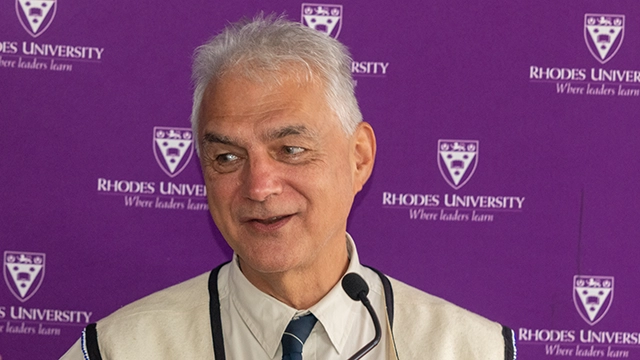
By Mo Senne, Senior Communications Officer, Rhodes University
In the intricate realm of media dynamics, the concepts of media capture and coercion wield significant influence on the information landscape. Consequently, in an era where information flows ubiquitously, the dynamics of media capture and coercion have taken on new dimensions, further complicated by the emergence of social media and cancel culture. Professor Guy Berger, a distinguished scholar in media studies with a PhD from Rhodes University, has brought forth insightful perspectives on the intricate interplay between these phenomena, sparking discussions on the subtle forces that can shape and manipulate media narratives.
Media Capture: A nuanced menace
Prof Berger contends that media capture, the phenomenon where influential actors gain control over media outlets, poses a nuanced threat to the independence and integrity of journalism. Delivering a workshop at the University of Liverpool recently, he lamented that rather than relying solely on overt censorship, media capture operates insidiously and/or clandestinely, influencing editorial decisions, story selection, and, ultimately, the narrative presented to the public. As media outlets become entangled with political or corporate interests, the integrity of information dissemination becomes compromised. Prof Berger called the workshop “A Tsunami Brewing: Media Capture & Media Coercion.”
The danger of the proliferation of media capture lies in its ability to create a semblance of diversity while homogenising content to align with specific agendas thereby jeopardising the watchdog role of journalism. This subtle manipulation erodes the watchdog role of the media, hindering its ability to hold power accountable and leaving the public with a distorted perception of reality with limited access to unbiased information.
Media coercion: Navigating the thin line
In addition to media capture, Prof Berger sheds light on media coercion, where external forces, whether governmental or corporate, exert pressure on journalists and media organisations. Coercion operates through a spectrum of tactics, including legal threats, economic pressures, and even physical intimidation. In such an environment, journalists face the daunting task of navigating a thin line and a precarious balance between their professional responsibilities and the potential consequences of dissent.
Berger's analysis underscores the importance of fortifying journalists' autonomy, as coercion not only stifles free expression but also compromises the diversity of voices essential for a robust and informed public sphere. The chilling effect of coercion can lead to journalists succumbing to self-censorship, inhibiting the media's efficacy as a check on power.
Social media: A double-edged sword
The advent of social media has revolutionised information dissemination, providing a platform for diverse voices and grassroots movements. However, Prof Berger acknowledges the dark side of this digital revolution, where the echo chambers and algorithmic biases inherent in social media platforms can contribute to the distortion of truth. According to him, “albeit there are different platforms, we are governed by one information ecosystem.”
While social media enhances the democratisation of information, it also amplifies the challenges posed by media capture and coercion. The rapid dissemination of misinformation and the virality of manipulated narratives on these platforms can exacerbate the erosion of journalistic integrity. Prof Berger asserts that albeit we have “more agency, we are not as free as we would like to believe – we are guided in choice structured through algorithms as platforms offer moderation as opposed to curation which is more important.”
Cancel culture: The unintended consequence
Berger's views on cancel culture add another layer to the discussion. While cancel culture often arises from a pursuit of justice, the rapid and sometimes indiscriminate nature of cancellations can undermine nuanced understanding and due process. The cancel culture phenomenon propagated through social media can inadvertently contribute to the suppression of diverse opinions and hinder open dialogue - the scales of justice are weighed against the chaos of online scrutiny.
The assertion that "cancel culture is a consequence of the erosion of truth and quality content" suggests a symbiotic relationship between the decline in journalistic integrity and the rise of cancel culture. In an environment where truth is elusive and quality content is compromised, cancel culture emerges as a response, driven by a desire for accountability and justice. In other words, the erosion of journalistic standards creates a vacuum filled by cancel culture, fuelled by the public’s frustration with a media landscape that fails to uphold the values of truth and quality information.
As we navigate the complex terrain of media dynamics, Prof Guy Berger's insights into media capture and coercion, and their interactions with social media and cancel culture offer a compelling framework for understanding the challenges that threaten the integrity of information dissemination and information ecosystems. It is crucial to heed Berger’s call for fortifying journalistic integrity, preserving autonomy, and fostering a media landscape that champions diversity, truth, and the principles essential for the health of resilient public spheres. It is through a collective commitment to these principles that we can ensure the media remains a potent force for truth, accountability, and profound transformation.

